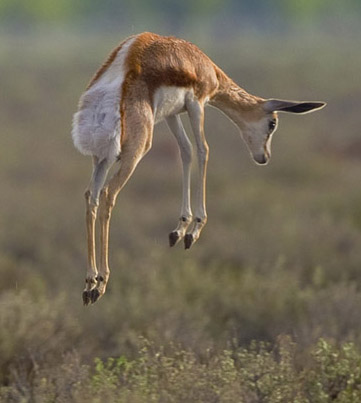 Gazelles engage in stotting, i.e., jumping into the air, when predators are nearby. A prevailing explanation of this behavior is that stotting is an honest signal of the animal's fitness to run away, so predators should not bother chasing it. This is just one of countless examples of signaling in biology.
Gazelles engage in stotting, i.e., jumping into the air, when predators are nearby. A prevailing explanation of this behavior is that stotting is an honest signal of the animal's fitness to run away, so predators should not bother chasing it. This is just one of countless examples of signaling in biology.
But I've often wondered: How does a signal get started? It relies on a mutual understanding between both parties about what the signal means. Before stotting becomes an understood practice, if a gazelle stotts one day, a cheetah doesn't know what to make of it, so the behavior does nothing but slow the gazelle down. (I'm assuming the cheetah doesn't engage in logical deduction about what being able to jump would imply about fitness. Even if cheetahs can do that, we couldn't use this explanation for signaling among insects and plants.)
The best guess I could come up with was that fitter gazelles naturally are more "jumpy," and cheetahs would have evolved classifiers to find the weaker gazelles using "lack of jumpiness" as a feature. Given this, fitter gazelles could look less promising to this classifier by jumping a little more, so they would evolve toward increased jumpiness. Then the cheetahs could pick up on the information and update their classifiers. The cycle could continue in a feedback loop. I found one article that affirms this idea. It calls the incidental traits associated with the property of interest "protosignals," which then get amplified.
Of course, signaling only works when it's differentially costly between those with and without the signaled trait. This makes some easy forms of aposematism hard to explain: If all a frog needs to do is have a bright-red skin to look poisonous, why don't lots of frogs engage in Batesian mimicry to get red skin? Is red skin somehow cheaper if you're poisonous than if you're not?
Verbal signals are easy ("talk is cheap"), so there's an extensive and unsettled debate about how honesty in human language might have evolved.